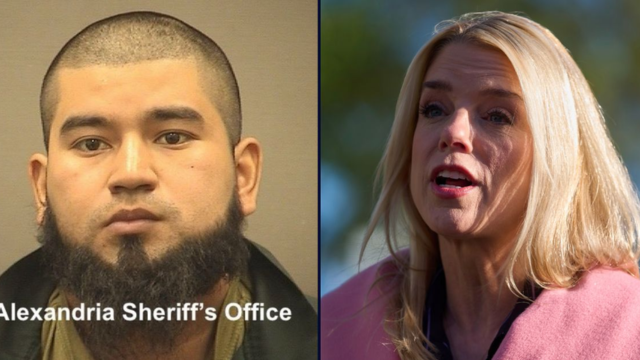On Tuesday, the Trump administration got criminal charges against a man dropped that he was accused of being a top MS-13 boss, but there was a catch. In this case, the judge put off his own order until Friday morning and told the federal government they couldn’t send him to the “jurisdiction” of the Department of Homeland Security until then.
During that three-day break, Henrry Villatoro Santos’s lawyer will be able to either appeal the decision or start a new case aimed at stopping the government from quickly “removal and deportation.”
One count of having a gun while being an undocumented immigrant was brought against Villatoro Santos on March 27.
If you look closely at the charging document and affidavit that were filed in his case, they don’t say much about his alleged ties to MS-13. However, at a press conference led by U.S. Attorney General Pam Bondi on the day he was arrested, FBI Director Kash Patel, Virginia Gov. Glenn Youngkin, and the U.S. Attorney for the Eastern District of Virginia Erik Siebert all said that Villatoro Santos was a top member of the notorious transnational criminal gang.
Trump administration officials, including President Trump, have made a lot of noise about the defendant’s claimed status within MS-13. The president has even called him a “major leader” of the transnational gang.
In court papers, the government only put forward one line that made these claims.
In the affidavit, federal authorities said, “FBI agents and TFOs also observed signs of MS-13 association in the garage bedroom.”
The government moved earlier this month to drop the gun charges. This happened the day after the federal public defender’s office dropped the case and Villatoro Santos hired a private lawyer.
On April 10, Muhammad Elsayed, the defense lawyer, criticized the development in a request to delay entry of dismissal. He said that the DOJ was dropping the gun possession case in favor of summary removal under immigration law, which gives defendants fewer constitutional rights.
Since then, both groups have talked about how “unusual” the case is.
“The undersigned is very aware of how unusual this motion is,” the defense motion says. “But things are different now.”
The government’s answer to the defense motion says it is not valid because it lacks legal arguments.
According to the DOJ move, Vallatoro doesn’t have any solid evidence to back up his “unusual” request. “That’s not a surprise, since his legal argument for delaying doesn’t hold water.”
Motions practice went on again on Monday.
When Villatoro Santos’ defense lawyer replied, he said again that his client was likely to end up like Kilmar Armando Abrego Garcia, a 29-year-old father with protected status who was sent illegally to the Centro de Confinamiento de Terrorismo (CECOT), a notorious prison in El Salvador, despite two court orders to the contrary.
In this case, the government has made it clear through public statements that it wants to hand over Mr. Villatoro Santos to the Salvadoran government so that he can be jailed there without any standards of due process, protection of constitutional rights, or oversight by the courts, the motion says. “This is the exact kind of bad thing that Rule 48(a)’s “leave of court” clause is meant to stop.”
The government used something called a “Rule 48 Motion” to get the case thrown out. This federal rule of criminal procedure controls case dismissals. It gives the court limited freedom to decide whether to accept a government-led dismissal or not.
The judge does have some freedom, though. The government has to get “leave of court,” which, according to long-standing case law, gives the judge “a discretion broad enough to protect the public interest in the fair administration of criminal justice.”
In the case of Villatoro Santos, the defense said the government wasn’t being clear about its plans to remove the person.
From the latest defense filing, at length:
One [sic] the one hand, if the Government intends to follow the law in its pursuit of Mr. Villatoro Santos’s removal — that is to serve him with a Notice to Appear (which it has not done to date), provide him with a Section 240 hearing, ensure his right to counsel is not infringed, and allow him the ability to contest his removability in immigration proceedings — then the Government’s motion to dismiss is not made in bad faith and is not clearly contrary to manifest public interest. On the other hand, if, as its public statements and its conduct to date strongly suggest, the Government intends to summarily deport Mr. Villatoro Santos by whisking him onto a plane to El Salvador without notice and a right to be heard in immigration proceedings, then the dismissal of the instant case at this time would clearly be done in bad faith and would be manifestly contrary to public interest. It does not serve the public interest, nor is it an act of good faith, for the Government to rush to deprive this Court of jurisdiction over Mr. Villatoro Santos if its aim is to thereafter deprive him of his well-established constitutional right to due process of law.
The defense then made it very clear that the Trump administration “has disregarded” the Fifth Amendment rights of many immigrants “in the context of removal proceedings.”
“The Government has ignored this well-established principle and broke court orders in other cases, effectively sending people to the black hole that is CECOT against their will,” the filing said. “The things it said in public about this case strongly suggest that it may want to do this again with Mr. Villatoro Santos.” And the Government’s reaction memorandum doesn’t make people less worried about the real possibility that it will break the law again to get good news stories. If the person signing this is completely wrong about everything, then the Government shouldn’t have any problems telling this Court what steps it plans to take to try to remove the person once this case is over.
For their part, the government seemed to agree that deporting Villatoro Santos is part of their plans for him.
One footnote in the government’s motion made last week says, “It is well within the prerogative of the United States to seek the removal of aliens who are here illegally or unlawfully in lieu of prosecuting them, regardless of whether charges have been filed.”
Another footnote hammered home the point:
While defendants are not entitled to tread water on the criminal docket while they explore potential avenues to thwart removal proceedings in immigration court, it is worth noting that Villatoro has already obtained nearly half the 14-day pause he seeks insofar as the motion to dismiss will remain unresolved pending the hearing scheduled for April 15
It is clear that the government persuaded the judge to give the “leave of court” needed for a voluntary dismissal during that hearing, as shown by a brief entry on Villatoro Santos’ legal file.
But there was also good news for the defense. They now have 72 hours to at least start persuading another judge (or judges) that the summary transfer to El Salvador is wrong.
What the short order says is “Gov’t Motion to Dismiss – Argued & GRANTED.” “It was ordered that the Order’s entry be DELAYED until 4/18/2025 at 10:00am.” Deft will not be turned over to DHS before April 18, 2025, at 10:00 a.m. “The order will follow.”





More Stories
Judge Drops Charges Against Alleged MS-13 Leader, Lets Him Fight Deportation
Judge Drops Charges Against Alleged MS-13 Leader, Lets Him Fight Deportation
Judge Drops Charges Against Alleged MS-13 Leader, Lets Him Fight Deportation